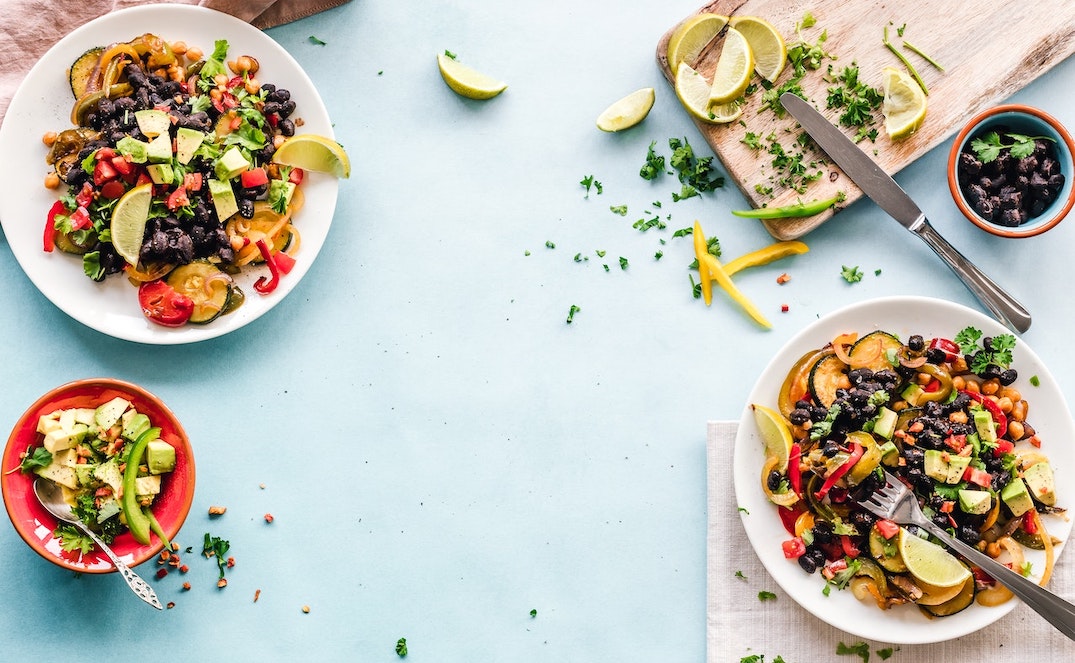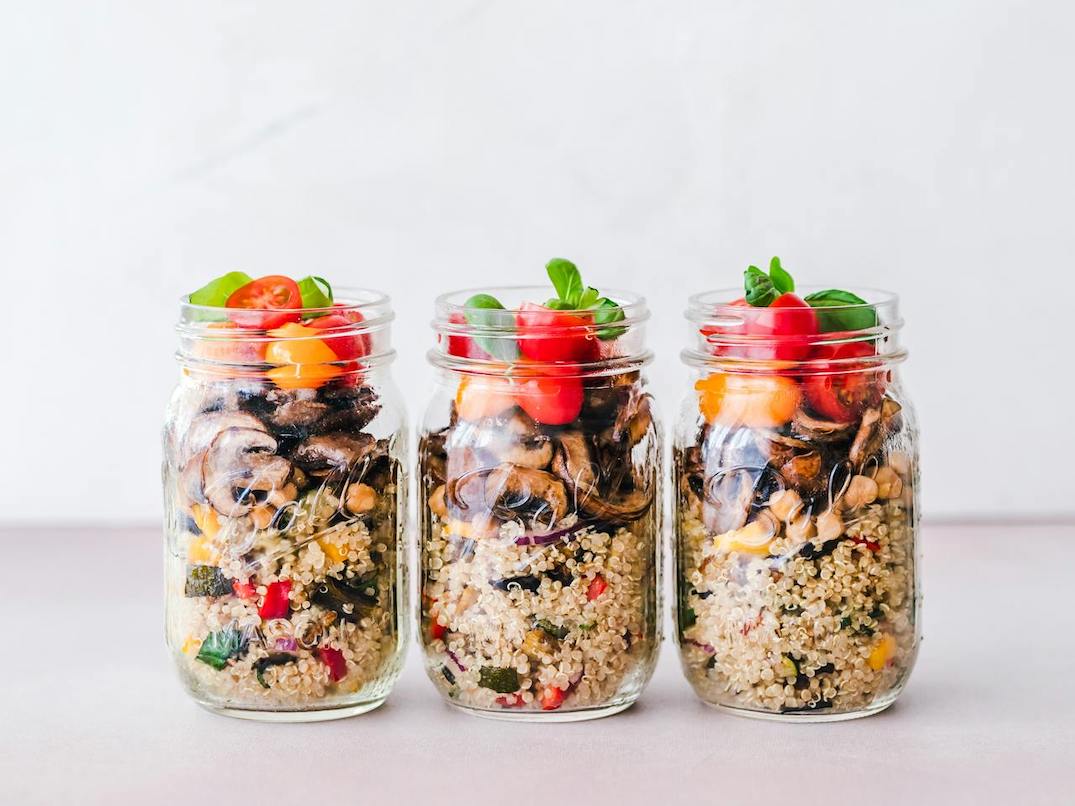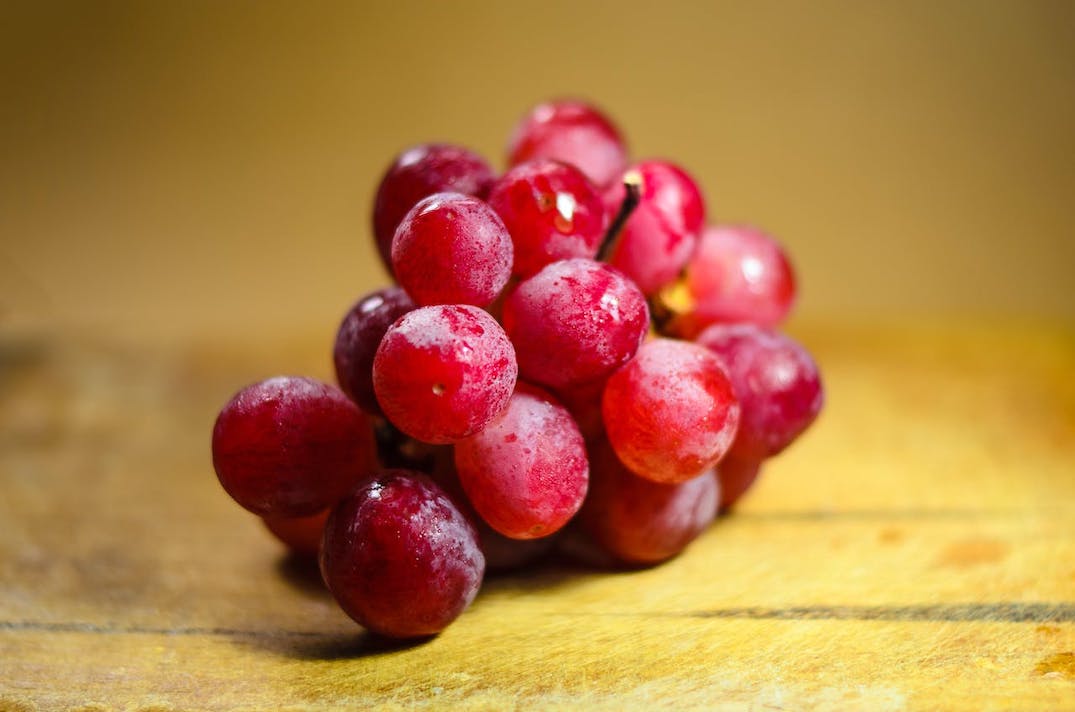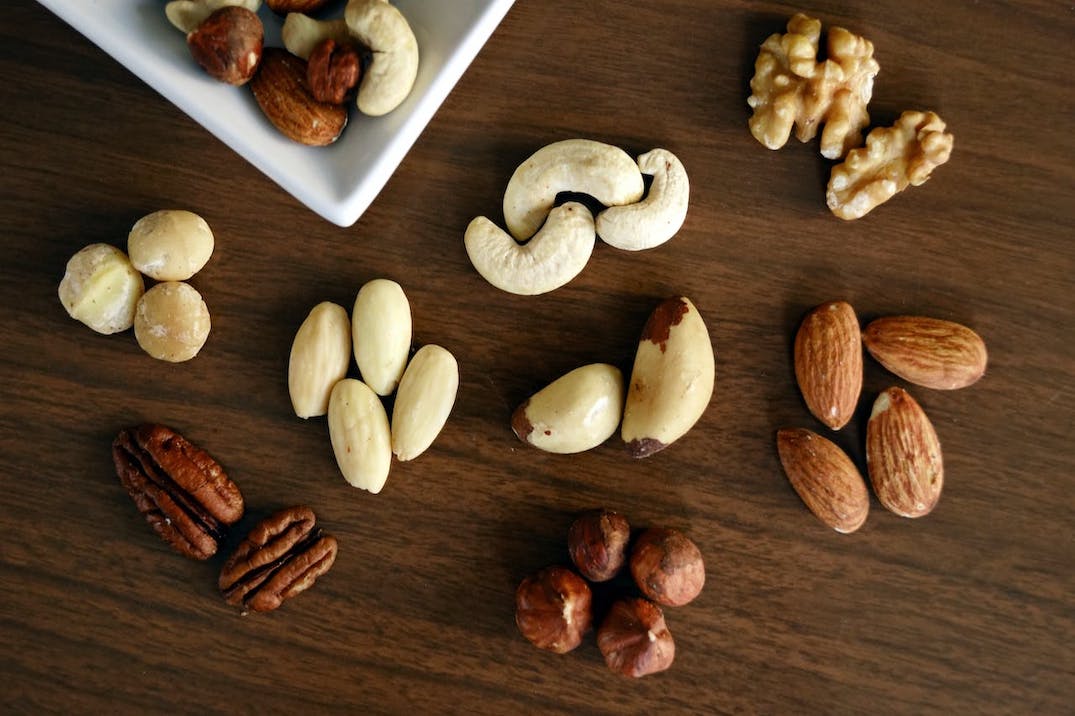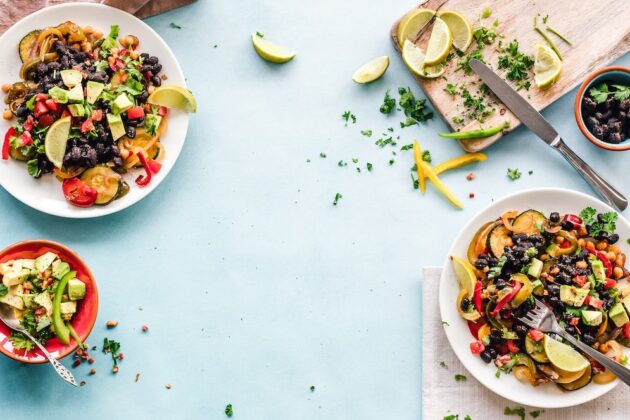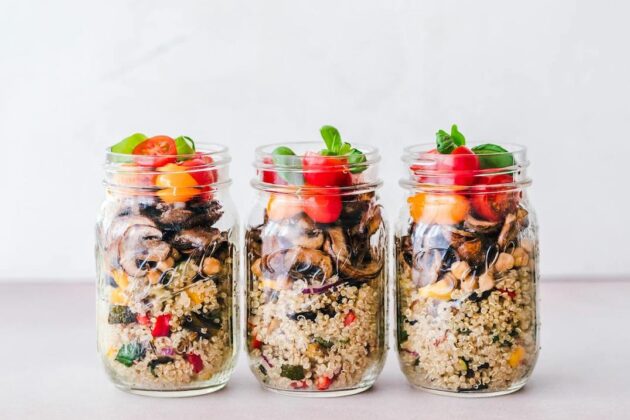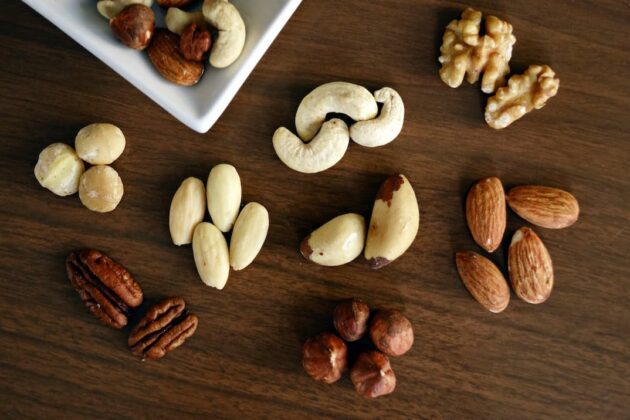Your Guide to Creating a Wedding Diet Plan (for Weight Loss & More)
If you’re getting married soon, you may be thinking of going on a diet so you look and feel your best on your big day. When preparing for your wedding, you may want to lose weight, tone your muscles, or improve your overall health so you can enjoy that special moment to the fullest.
Whatever your goals are, the process of crafting a wedding diet plan remains the same. This guide goes over how to do it, including tips for weight loss, meal ideas, and much more.
Key points for your wedding diet plan
There’s a lot that goes into creating a healthy wedding diet plan, which we’ll go over below, but here are the key points:
- Decide on a healthy wedding day goal weight. Know where you want to be the day you get married and start from there.
- Calculate your caloric needs & track your foods to make sure you hit them. Consider using a TDEE calculator and a tracking app, such as MyFitnessPal or LoseIt, to keep you accountable to your goals.
- Choose healthy foods. Prioritize whole foods such as fruits, veggies, lean meats, low-fat dairy, beans, legumes, nuts, and seeds.
- Avoid highly processed foods. Limit highly processed foods such as packaged snack foods, baked goods, pre-made meals, refined carbohydrates, soda, and candy.
- Reduce or eliminate alcohol. Be mindful of your alcohol intake as this can hinder your wedding day goals. Practice moderation or cut it out altogether until the big day arrives.
- Create an exercise plan. Get a movement routine that keeps you going. Choose something you enjoy and get into a routine to stay consistent.
- Avoid crash diets. Avoid any restrictive dieting as this is not sustainable. Instead, set small, incremental goals throughout the process to avoid getting overwhelmed.
- Consider working with a dietitian. Dietitians can help you lose weight, create meal plans, and provide a variety of other benefits. Get support from a Registered Dietitian (RD) to help you hit your goals with a tailored plan that takes your personal preferences to heart.

Reach your weight loss goals faster with support from a Registered Dietitian
90% of Zaya Care patients pay $0 for dietitian visits
How to create a wedding diet plan
If you are looking for ideas on how to create a detailed wedding diet plan that works for you and your goals, we’ve got your back. Below are some tips on how to create a plan that can help get you feeling your best by your big day.
1) Decide on your weight goal & calculate how many calories you need
If you are hoping to lose weight for your wedding day, it helps to have a goal in mind. Be realistic and consider your wedding time frame. For example, it’s unlikely to lose 50 pounds or more within two months. Set reasonable goals that have sustainability in mind.
Next, you want to know how much you should be eating. This will be a different number for everyone. Your recommended calorie intake will depend on a variety of factors including your age, gender, height, weight, and activity level.
Even if your goal is not to lose weight but rather to increase muscle tone, knowing your recommended calorie range is important. The best way to get accurate numbers is to use a Total Daily Energy Expenditure (TDEE) calculator like this one.
Once you get your TDEE, what you do next will depend on your goals. If you are aiming for weight loss, you want to create a calorie deficit. However, it’s important to be mindful not to reduce your calorie intake too much or this could cause negative health effects.
Aim for a 500-calorie deficit per day. If your TDEE is 2100 calories, this means you should be consuming no less than 1600 calories per day.
If your goal is to increase muscle, without altering your weight, you would maintain or slightly increase your TDEE by 200-300 calories per day to support muscle growth, with an emphasis on high-protein foods.
If you are looking to achieve body recomposition (decreasing fat and increasing muscle), you will choose a calorie deficit and emphasize protein.
The easiest way to stay on track with your calorie goals is to use an app such as MyFitnessPal or LoseIt. These apps also include information regarding your macronutrient intake (proportions of carbohydrates, fats, and protein you consume).
This information is helpful for those looking to build muscle tone as you will want to increase your protein intake.
2) Choose meals that fit your goals
Now that you know what calorie range you should be in, the next step is to find meals that fit into your goals. This can be done by searching online recipe resources such as Pinterest or AllRecipes.com. You can also ask family and friends or purchase weight loss recipe books.
Regardless of your wedding diet goals, it’s important to choose meals that include more whole foods such as:
- Lean cuts of meat, poultry, and seafood
- Low-fat dairy
- Fruits
- Vegetables
- Beans and legumes
- Nuts and seeds
- Whole grains
Avoid or limit heavily processed food items such as:
- Frozen or pre-made meals
- Canned items
- Packaged snack foods
- Pre-made baked goods
- Candy
- Soda
A good rule for creating balanced, healthy meals is to look for options that have a protein source, a complex or high-fiber carbohydrate source, healthy fats, and fruits or veggies.
An example of this kind of meal is one chicken breast with a cup of quinoa and two cups of mixed veggies roasted in olive oil.
Below are some of my favorite healthy online recipes for those looking for a little inspiration.
Wedding meal prep ideas if you’re trying to lose weight:
- Taste Smashed Chickpea Bruschetta. If you’re looking for a high-fiber, budget-friendly, and ultra-simple breakfast recipe, this smashed chickpea bruschetta from Taste is elite. It takes only a few minutes to toss together and it’s incredibly satisfying.
- Eating Well Mushroom and Tofu Stir Fry. This 15-minute Mediterranean-inspired stir-fry recipe is as easy as it is nutritious. It’s an easy way to incorporate a good source of protein with a ton of veggies.
- AllRecipes Marinated Tuna Steak. This recipe is super simple and wildly delicious. You can serve it with a hearty side salad, over a high-fiber grain, or anything in between. It’s rich in protein and very filling for those looking to lose weight.
3) Meal prep weekly
If we don’t have the time or energy to prepare a meal, we are more likely to choose convenience foods or fast-food options that can negatively impact our goals. Make your life easier each week by meal prepping—planning and prepping meals or ingredients ahead.
Meal prep can look different for everyone. The main goal is to make it easier to grab healthy, home-cooked meals throughout the week.
Meal prep can include preparing breakfast and lunch ahead of time for busy work days, or it could be prepping a bunch of lean meat, veggies, and complex carbs to create different, easy meals throughout the week.
The key to determining what your meal prep looks like is figuring out what makes it easiest for you to choose healthy meals throughout the day. Start by choosing your most difficult meal and then prep that one ahead of time.
4) Have a plan for eating at pre-wedding events
With the big day comes a lot of pre-wedding events such as a wedding shower, cake testing, dress shopping, choosing a venue, the Bachelor/Bachelorette party, the rehearsal dinner, and more.
While these events should be enjoyed, it can be easy to go overboard and halt your progress. Plan for these events and consider what different options for food and drink will be available. This can allow you to make good choices and indulge when it’s most meaningful to you.
For example, no one wants to skip out on cake testing but splurging on extra appetizers or a few glasses of champagne while shopping for wedding venues or wedding dresses may not be all that important to you.

Reach your weight loss goals faster with support from a Registered Dietitian
90% of Zaya Care patients pay $0 for dietitian visits
Sample day of pre-wedding meal plan
If you aren’t sure how to put all this into practice, consider the following sample pre-wedding meal plan provided below. This meal plan includes three balanced meals with snacks in between that emphasize protein to keep you full and satisfied while hitting your goals.
Sample Pre-Wedding Meal Plan
Breakfast
- 1 slice of whole-grain bread
- ½ cup cottage cheese
- ½ sliced avocado
- 1 tsp everything but the bagel seasoning
- ½ cup fresh blueberries
Snack
- Low-sugar Greek yogurt
- ½ cup sliced strawberries
- ¼ cup sliced almonds
Lunch
- 4 ounces of baked Atlantic salmon
- 1 cup quinoa cooked in chicken bone broth
- Mixed veggies roasted in olive oil and seasoning
Snack
- String cheese
- 1 small apple
Dinner
- 4-ounce grilled chicken breast
- 1 cup couscous
- Small Greek salad w/ kalamata olives, feta, hard-boiled egg, and oil and vinegar dressing
Tips for your pre-wedding diet & losing weight before your big day
Now that you know how to craft your pre-wedding diet, it’s time to put it into action. Consider the tips below to get more out of your plan and make your life easier.
1) Measure everything & track your food intake
Sometimes we are eating the right foods for our goal, but we may be accidentally underestimating our portion sizes.
To make sure you are hitting your target calorie ranges and macronutrients, consider tracking your intake. This can help hold you accountable and keep you within the right ranges to nail your goals.
Apps such as MyFitnessPal or LoseIt are user-friendly options if you wish to track through your phone. You can also track using a food diary if technology is not your thing.
2) Stay hydrated
Our bodies can sometimes mix up thirst with hunger, making us more likely to snack when we aren’t adequately hydrated. Dehydration can also zap our energy levels, leaving us feeling less motivated to do daily tasks.
Prioritize water during and between meals. Aim to sip on water throughout the day versus chugging a large amount in one sitting. It’s recommended that we get between 2.7 to 3.7 liters of water per day however, your fluid needs will vary depending on a variety of factors.
For example, if you live in a hot climate or spend a lot of time outside in the sun, you likely need more water. The best way to tell if you are adequately hydrated is by checking the color of your urine. It should be a pale yellow.
If it’s dark, you need more. If it’s clear, you probably don’t need as much.
3) Include fiber, healthy fats, and lean protein in every meal
Just because you are on a diet doesn’t mean you need to feel hungry all the time. Prioritize filling foods like protein, healthy fats, and fiber. These foods can help to increase satiety and make snacking less tempting, making sticking with your goals a lot easier.
- Fiber. Fibrous foods, especially those high in soluble fiber, slow how fast our stomach empties, increase perceived satiety, and help with appetite regulation. Most foods contain a mixture of both soluble and insoluble fibers. Whole grains, avocados, berries, beans, legumes, broccoli, Brussels sprouts, nuts, and seeds are all good sources of fiber.
- Healthy Fats. Healthy fats, such as olive oil, olives, nuts, seeds, avocado, and fatty fish such as salmon or tuna, are rich in unsaturated fatty acids which help to promote fullness during meals and allow for improved appetite regulation.
- Lean Protein. Protein is considered one of the most filling nutrients. Consuming a high-protein diet is associated with promoting satiety and reducing body fat. Opt for lean sources of protein such as lean cuts of beef, skinless chicken or turkey breast, and seafood.
4) Avoid these foods
There are some foods you will want to limit or avoid while you are working on your goals for your wedding. Below are some specific types of foods that could potentially hinder your progress if over-consumed:
- Processed foods. Highly processed foods such as cookies, crackers, baked goods, frozen meals, etc. should be limited. These foods contain high amounts of calories, sodium, and added sugars which can halt your weight loss progress.
- Fatty foods. Fatty foods such as fried foods (fried chicken, French fries, onion rings, etc.) contain high amounts of saturated fats and calories. Both can contribute to weight gain and potential health complications.
- Sugary foods. Sugary foods such as soda, candy, baked goods, cereals, ice cream, and more are calorie-dense and can contribute to weight gain. In fact, added sugar consumption in the U.S. is said to be the main contributor to obesity.
- White bread & pastries. Refined carbohydrates found in white bread, pastries, and other baked goods contribute to our overall added sugar intake. They are high in calories and lacking many essential nutrients, including those that make us feel full.
- Fast foods. While convenient, fast food should be limited or avoided as much as possible. It can be challenging to make healthy choices when dining at these establishments as many options contain similar ingredients to processed food items such as high amounts of calories, sodium, fat, and sugar.
5) Keep only healthy snacks around
To avoid overindulging in snack foods such as processed chips, crackers, and cookies, plan to have healthy snacks readily available. This reduces the likelihood that you will reach for a processed snack out of convenience and keeps you on track with your goals.
Try to incorporate filling foods into your snacks as well as your meals. For example, if you like fruit, have it with a protein source such as cheese, a hardboiled egg, or a handful of nuts. This will keep you satisfied a lot longer than just consuming a small portion of fruit.
6) Reduce or eliminate alcohol
Alcoholic beverages, such as beer, wine, hard liquor, and mixed drinks, can contribute to increased calorie and added sugar intake. For example, a 5-ounce glass of red wine contains roughly 125 calories.
If you regularly consume three to four alcoholic beverages per day, the calorie intake alone is enough to hinder weight loss efforts. In addition, many people find alcohol increases their desire to snack, which could lead to even further increases in caloric intake, potentially leading to weight gain.
While an occasional glass of wine won’t result in weight gain, it’s important to be mindful of your alcohol consumption as it can contribute a lot of additional calories that may not be accounted for in your plan.
7) Don’t forget about exercise
Movement is an important factor in weight loss as well as gaining muscle mass or losing body fat. There are no set requirements for the specific types of exercises you should be doing, it’s more important to find something you enjoy that you will do consistently.
According to the Centers for Disease Control and Prevention (CDC), it’s recommended to incorporate 150 minutes of moderate-intensity or 75 minutes of vigorous-intensity aerobic activity per week along with two or more days of muscle-strengthening activities.
Incorporating a mixture of both cardio and strength-based exercises is ideal to get the most benefits for weight loss. An example would be 30 minutes a day of walking five days a week and 30 minutes of full-body strength training exercises two days a week, such as weight lifting.
Exercise helps to increase your calorie deficit while also encouraging muscle growth which can increase our metabolic function and allow for a greater calorie burn at rest.
8) Make sure you’re getting enough sleep
It’s easy to focus solely on diet and exercise for weight loss or other health goals, but it’s important to consider your sleep quality as well. Poor sleep can contribute to challenges with our health and our weight.
Chronic sleep deprivation can increase oxidative stress and increase the risk of insulin resistance. Many who suffer from poor sleep also experience higher rates of snacking. If you are spending more time awake, you’re more likely to grab for extra snacks.
Additionally, poor sleep can negatively affect your body’s circadian rhythm, another factor that can contribute to an increase in weight. Aim for between seven to nine hours of high-quality sleep every night to ensure you are well-rested.
Prioritize a bedtime routine that involves going to sleep around the same time every night and avoid the use of blue light devices such as your phone, television, or computer before bed as these can disrupt your ability to go to sleep.
9) Manage your stress as much as possible
Chronic stress can create alterations in your food intake and fat storage. When we are experiencing high levels of stress for extended periods, our body releases the hormone cortisol which can cause an accumulation of fat in the abdominal region.
Practice coping techniques to help you better manage your stress so it doesn’t get in the way of your health goals. Common stress management techniques include deep breathing, meditation, yoga, guided imagery, and exercise.
10) Consider working with a dietitian
Regardless of your goals for your wedding day, getting personal and professional advice from a nutritionist or dietitian is almost always worth it as it can bring clarity to your nutrition needs and the best weight loss strategy for you. Dietitians are nutrition professionals who can provide you with extra support and guidance on your health journey.
Most importantly, dietitians can help you create a plan that works for you. Instead of trying to alter your life to fit into a pre-made diet that isn’t sustainable, a dietitian can help you learn how to implement small changes in your current diet to meet your goals and maintain them.
When you request an appointment with one of our Registered Dietitians here at Zaya Care, we’ll check your insurance so you know exactly how much you’ll have to pay, if anything at all.
It’s worth noting that 90% of Zaya Care patients pay $0 for nutrition care with a registered dietitian as we are in-network with many major carriers.

Reach your weight loss goals faster with support from a Registered Dietitian
90% of Zaya Care patients pay $0 for dietitian visits
Sample wedding diet shopping list
Here is an example wedding diet shopping list that includes healthy foods that you can combine for a variety of meals:
- Fruits – Bananas, apples, strawberries, pineapples, blueberries
- Vegetables – Broccoli, spinach, bell peppers, carrots, zucchini, kale, cauliflower
- Lean proteins – Chicken breast, turkey breast, salmon, tilapia, tuna, tofu, Greek yogurt, eggs, cottage cheese
- Whole grains – Brown rice, quinoa, whole grain pasta, oats, whole grain bread
- Healthy fats – Avocado, almonds, walnuts, olive oil, chia seeds, flaxseeds
- Dairy or alternatives – Low-fat milk, almond milk, low-fat cheese, cottage cheese, low-sugar fat-free Greek yogurt
- Legumes and beans – Chickpeas, lentils, black beans, kidney beans
- Herbs and spices – Garlic, basil, cumin, paprika, turmeric
- Misc – Almond butter, peanut butter, hummus, guacamole, balsamic vinegar, low-sodium soy sauce
Diet tips for the month leading up to your wedding
While the month leading up to your wedding can be a bit chaotic if you haven’t quite reached your goals yet, this is an important time to consider and plan for. During this time, moderation will be your best friend.
It can be easy to fall off the rails with all the excitement. It’s essential to allow yourself to enjoy the important moments but also to recognize when you don’t need to indulge. This will allow you to prioritize what you are most looking forward to without sacrificing all the work you have done.
Below are some additional tips to consider within the month of your wedding day. Add these efforts to all the other work you have been doing, and you are all ready to enjoy your big day to the fullest.
Over one week out from your wedding day
- Hydrate. Keep your hydration up to help manage your appetite and keep up your energy levels throughout this busy time.
- Reduce processed foods. Make sure you are limiting your processed food intake, even during the busy times. When you need something fast, try to choose foods that are less processed such as hard-boiled eggs versus something like chips or crackers.
- Reduce or avoid foods that result in bloating. Foods that cause uncomfortable bloating such as high-salt, high-fat, or high-fiber foods should be avoided during this time so you can fully enjoy your events.
- Incorporate skin-loving foods. Keep your skin looking radiant for the big day by prioritizing skin-loving foods such as fruits, vegetables, and healthy fats. These foods contain vitamins, minerals, antioxidants, and other compounds that help give you that desired glowing complexion.
- Be mindful of carbs. Even though it’s stressful, try to be mindful of your carbohydrate intake, especially refined carbs. Choose high-fiber carb sources most of the time to keep you feeling satisfied and increase your nutrition.
- Manage your sleep and stress levels. Although it can seem difficult, prioritizing sleep and stress management is especially important during this time as they can be easily thrown off by all the festivities and planning. You don’t want to be bogged down by stress and exhaustion when the day finally comes.
- Keep up with movement. Exercise can help with both sleep and stress so be sure to stay on top of your exercise routine as best as you can during this busy time.
The week of your wedding
- Meal prep for your wedding week. The week of the big day is when you are going to be your busiest. This is an easy time to fall off track. Meal prep your meals and snacks as best as you can before this time to avoid going off course.
- Avoid foods that cause bloating. Avoiding foods that make you bloat is especially important within a week of your wedding to ensure you feel your best and not sluggish or uncomfortable.
- Don’t eat too much salt. High-salt foods can cause bloating and can be easy to miss when you’re in the thick of wedding shenanigans. Watch out for extra salt hidden in things such as cheese, pickles, cold cuts, processed foods, and breads.
- Stick with your usual intake as much as possible. Try to maintain some semblance of normalcy with your diet during this time to avoid any uncomfortable side effects from overindulging.
- Don’t overdo it with alcohol. The week before you say “I do,” the alcohol will likely be flowing. Try to moderate your intake to avoid feeling sluggish, or worse, hungover, during the wedding festivities.
Wedding diet plan FAQs
How long before your wedding should you start dieting?
How long before your wedding you should start dieting will vary depending on your goals. Ideally, once you know you are getting married, it’s a good time to consider what goals you have for that day and go from there. It never hurts to start early.
How much weight do brides lose before their wedding?
It’s estimated that brides will lose an average of 20 pounds before their wedding to look and feel their best for the big day. However, this is not proven by research. There is no set number and everyone’s goals are different.
How can I lose belly fat for my wedding?
Unfortunately, no diet or exercise plan can help with reducing belly fat on its own. Instead, incorporating a healthy, balanced diet with regular exercise and managing your sleep and stress is key to helping reduce all fat, some of which may be from the abdominal region.
How can I stick to my wedding diet?
When preparing your wedding diet plan, make sure you are making reasonable changes. Don’t change everything all at once. Instead, set incremental goals. This makes it less overwhelming and easier to stick with. Be sure to practice moderation and not severe restrictions.
When should I cut carbs before my wedding?
Contrary to popular belief, you don’t have to cut out carbs to lose weight. While some research supports a lower-carb diet for helping with weight loss, it’s not the only way. It’s also difficult to define and for many, difficult to sustain.
Instead, consider prioritizing high-fiber carbs and managing your portion sizes. Focus on whole-food carb sources versus processed carbs and do this gradually until your wedding day arrives. No need to rapidly cut them out right before as this is not a sustainable approach.
What foods should I avoid before my wedding?
The best foods to steer clear of right before your wedding include highly processed food items, those that might induce gas or bloating, and excessive amounts of alcohol. These foods can make you feel unwell and may make fitting into your gown more difficult.
Is three months enough time to lose weight for my wedding?
Whether or not three months is a sufficient amount of time for weight loss will depend on your weight loss goals. For example, it’s possible to lose 10 pounds in three months but not 30 or more pounds.
A healthy rate of weight loss is about one to two pounds per week. Use this as a guide to determine a good time frame to set your weight loss goals.
What kind of workouts should I do before my wedding?
The best workouts to incorporate are ones that you enjoy and will stick with. Ideally, choose a combination of cardio and strength-based exercises each week. Which types you choose will depend on your preference.

Reach your weight loss goals faster with support from a Registered Dietitian
90% of Zaya Care patients pay $0 for dietitian visits
If you’re getting married soon, you may be thinking of going on a diet so you look and feel your best on your big day. When preparing for your wedding, you may want to lose weight, tone your muscles, or improve your overall health so you can enjoy that special moment to the fullest.
Whatever your goals are, the process of crafting a wedding diet plan remains the same. This guide goes over how to do it, including tips for weight loss, meal ideas, and much more.
Key points for your wedding diet plan
There’s a lot that goes into creating a healthy wedding diet plan, which we’ll go over below, but here are the key points:
- Decide on a healthy wedding day goal weight. Know where you want to be the day you get married and start from there.
- Calculate your caloric needs & track your foods to make sure you hit them. Consider using a TDEE calculator and a tracking app, such as MyFitnessPal or LoseIt, to keep you accountable to your goals.
- Choose healthy foods. Prioritize whole foods such as fruits, veggies, lean meats, low-fat dairy, beans, legumes, nuts, and seeds.
- Avoid highly processed foods. Limit highly processed foods such as packaged snack foods, baked goods, pre-made meals, refined carbohydrates, soda, and candy.
- Reduce or eliminate alcohol. Be mindful of your alcohol intake as this can hinder your wedding day goals. Practice moderation or cut it out altogether until the big day arrives.
- Create an exercise plan. Get a movement routine that keeps you going. Choose something you enjoy and get into a routine to stay consistent.
- Avoid crash diets. Avoid any restrictive dieting as this is not sustainable. Instead, set small, incremental goals throughout the process to avoid getting overwhelmed.
- Consider working with a dietitian. Dietitians can help you lose weight, create meal plans, and provide a variety of other benefits. Get support from a Registered Dietitian (RD) to help you hit your goals with a tailored plan that takes your personal preferences to heart.

Reach your weight loss goals faster with support from a Registered Dietitian
90% of Zaya Care patients pay $0 for dietitian visits
How to create a wedding diet plan
If you are looking for ideas on how to create a detailed wedding diet plan that works for you and your goals, we’ve got your back. Below are some tips on how to create a plan that can help get you feeling your best by your big day.
1) Decide on your weight goal & calculate how many calories you need
If you are hoping to lose weight for your wedding day, it helps to have a goal in mind. Be realistic and consider your wedding time frame. For example, it’s unlikely to lose 50 pounds or more within two months. Set reasonable goals that have sustainability in mind.
Next, you want to know how much you should be eating. This will be a different number for everyone. Your recommended calorie intake will depend on a variety of factors including your age, gender, height, weight, and activity level.
Even if your goal is not to lose weight but rather to increase muscle tone, knowing your recommended calorie range is important. The best way to get accurate numbers is to use a Total Daily Energy Expenditure (TDEE) calculator like this one.
Once you get your TDEE, what you do next will depend on your goals. If you are aiming for weight loss, you want to create a calorie deficit. However, it’s important to be mindful not to reduce your calorie intake too much or this could cause negative health effects.
Aim for a 500-calorie deficit per day. If your TDEE is 2100 calories, this means you should be consuming no less than 1600 calories per day.
If your goal is to increase muscle, without altering your weight, you would maintain or slightly increase your TDEE by 200-300 calories per day to support muscle growth, with an emphasis on high-protein foods.
If you are looking to achieve body recomposition (decreasing fat and increasing muscle), you will choose a calorie deficit and emphasize protein.
The easiest way to stay on track with your calorie goals is to use an app such as MyFitnessPal or LoseIt. These apps also include information regarding your macronutrient intake (proportions of carbohydrates, fats, and protein you consume).
This information is helpful for those looking to build muscle tone as you will want to increase your protein intake.
2) Choose meals that fit your goals
Now that you know what calorie range you should be in, the next step is to find meals that fit into your goals. This can be done by searching online recipe resources such as Pinterest or AllRecipes.com. You can also ask family and friends or purchase weight loss recipe books.
Regardless of your wedding diet goals, it’s important to choose meals that include more whole foods such as:
- Lean cuts of meat, poultry, and seafood
- Low-fat dairy
- Fruits
- Vegetables
- Beans and legumes
- Nuts and seeds
- Whole grains
Avoid or limit heavily processed food items such as:
- Frozen or pre-made meals
- Canned items
- Packaged snack foods
- Pre-made baked goods
- Candy
- Soda
A good rule for creating balanced, healthy meals is to look for options that have a protein source, a complex or high-fiber carbohydrate source, healthy fats, and fruits or veggies.
An example of this kind of meal is one chicken breast with a cup of quinoa and two cups of mixed veggies roasted in olive oil.
Below are some of my favorite healthy online recipes for those looking for a little inspiration.
Wedding meal prep ideas if you’re trying to lose weight:
- Taste Smashed Chickpea Bruschetta. If you’re looking for a high-fiber, budget-friendly, and ultra-simple breakfast recipe, this smashed chickpea bruschetta from Taste is elite. It takes only a few minutes to toss together and it’s incredibly satisfying.
- Eating Well Mushroom and Tofu Stir Fry. This 15-minute Mediterranean-inspired stir-fry recipe is as easy as it is nutritious. It’s an easy way to incorporate a good source of protein with a ton of veggies.
- AllRecipes Marinated Tuna Steak. This recipe is super simple and wildly delicious. You can serve it with a hearty side salad, over a high-fiber grain, or anything in between. It’s rich in protein and very filling for those looking to lose weight.
3) Meal prep weekly
If we don’t have the time or energy to prepare a meal, we are more likely to choose convenience foods or fast-food options that can negatively impact our goals. Make your life easier each week by meal prepping—planning and prepping meals or ingredients ahead.
Meal prep can look different for everyone. The main goal is to make it easier to grab healthy, home-cooked meals throughout the week.
Meal prep can include preparing breakfast and lunch ahead of time for busy work days, or it could be prepping a bunch of lean meat, veggies, and complex carbs to create different, easy meals throughout the week.
The key to determining what your meal prep looks like is figuring out what makes it easiest for you to choose healthy meals throughout the day. Start by choosing your most difficult meal and then prep that one ahead of time.
4) Have a plan for eating at pre-wedding events
With the big day comes a lot of pre-wedding events such as a wedding shower, cake testing, dress shopping, choosing a venue, the Bachelor/Bachelorette party, the rehearsal dinner, and more.
While these events should be enjoyed, it can be easy to go overboard and halt your progress. Plan for these events and consider what different options for food and drink will be available. This can allow you to make good choices and indulge when it’s most meaningful to you.
For example, no one wants to skip out on cake testing but splurging on extra appetizers or a few glasses of champagne while shopping for wedding venues or wedding dresses may not be all that important to you.

Reach your weight loss goals faster with support from a Registered Dietitian
90% of Zaya Care patients pay $0 for dietitian visits
Sample day of pre-wedding meal plan
If you aren’t sure how to put all this into practice, consider the following sample pre-wedding meal plan provided below. This meal plan includes three balanced meals with snacks in between that emphasize protein to keep you full and satisfied while hitting your goals.
Sample Pre-Wedding Meal Plan
Breakfast
- 1 slice of whole-grain bread
- ½ cup cottage cheese
- ½ sliced avocado
- 1 tsp everything but the bagel seasoning
- ½ cup fresh blueberries
Snack
- Low-sugar Greek yogurt
- ½ cup sliced strawberries
- ¼ cup sliced almonds
Lunch
- 4 ounces of baked Atlantic salmon
- 1 cup quinoa cooked in chicken bone broth
- Mixed veggies roasted in olive oil and seasoning
Snack
- String cheese
- 1 small apple
Dinner
- 4-ounce grilled chicken breast
- 1 cup couscous
- Small Greek salad w/ kalamata olives, feta, hard-boiled egg, and oil and vinegar dressing
Tips for your pre-wedding diet & losing weight before your big day
Now that you know how to craft your pre-wedding diet, it’s time to put it into action. Consider the tips below to get more out of your plan and make your life easier.
1) Measure everything & track your food intake
Sometimes we are eating the right foods for our goal, but we may be accidentally underestimating our portion sizes.
To make sure you are hitting your target calorie ranges and macronutrients, consider tracking your intake. This can help hold you accountable and keep you within the right ranges to nail your goals.
Apps such as MyFitnessPal or LoseIt are user-friendly options if you wish to track through your phone. You can also track using a food diary if technology is not your thing.
2) Stay hydrated
Our bodies can sometimes mix up thirst with hunger, making us more likely to snack when we aren’t adequately hydrated. Dehydration can also zap our energy levels, leaving us feeling less motivated to do daily tasks.
Prioritize water during and between meals. Aim to sip on water throughout the day versus chugging a large amount in one sitting. It’s recommended that we get between 2.7 to 3.7 liters of water per day however, your fluid needs will vary depending on a variety of factors.
For example, if you live in a hot climate or spend a lot of time outside in the sun, you likely need more water. The best way to tell if you are adequately hydrated is by checking the color of your urine. It should be a pale yellow.
If it’s dark, you need more. If it’s clear, you probably don’t need as much.
3) Include fiber, healthy fats, and lean protein in every meal
Just because you are on a diet doesn’t mean you need to feel hungry all the time. Prioritize filling foods like protein, healthy fats, and fiber. These foods can help to increase satiety and make snacking less tempting, making sticking with your goals a lot easier.
- Fiber. Fibrous foods, especially those high in soluble fiber, slow how fast our stomach empties, increase perceived satiety, and help with appetite regulation. Most foods contain a mixture of both soluble and insoluble fibers. Whole grains, avocados, berries, beans, legumes, broccoli, Brussels sprouts, nuts, and seeds are all good sources of fiber.
- Healthy Fats. Healthy fats, such as olive oil, olives, nuts, seeds, avocado, and fatty fish such as salmon or tuna, are rich in unsaturated fatty acids which help to promote fullness during meals and allow for improved appetite regulation.
- Lean Protein. Protein is considered one of the most filling nutrients. Consuming a high-protein diet is associated with promoting satiety and reducing body fat. Opt for lean sources of protein such as lean cuts of beef, skinless chicken or turkey breast, and seafood.
4) Avoid these foods
There are some foods you will want to limit or avoid while you are working on your goals for your wedding. Below are some specific types of foods that could potentially hinder your progress if over-consumed:
- Processed foods. Highly processed foods such as cookies, crackers, baked goods, frozen meals, etc. should be limited. These foods contain high amounts of calories, sodium, and added sugars which can halt your weight loss progress.
- Fatty foods. Fatty foods such as fried foods (fried chicken, French fries, onion rings, etc.) contain high amounts of saturated fats and calories. Both can contribute to weight gain and potential health complications.
- Sugary foods. Sugary foods such as soda, candy, baked goods, cereals, ice cream, and more are calorie-dense and can contribute to weight gain. In fact, added sugar consumption in the U.S. is said to be the main contributor to obesity.
- White bread & pastries. Refined carbohydrates found in white bread, pastries, and other baked goods contribute to our overall added sugar intake. They are high in calories and lacking many essential nutrients, including those that make us feel full.
- Fast foods. While convenient, fast food should be limited or avoided as much as possible. It can be challenging to make healthy choices when dining at these establishments as many options contain similar ingredients to processed food items such as high amounts of calories, sodium, fat, and sugar.
5) Keep only healthy snacks around
To avoid overindulging in snack foods such as processed chips, crackers, and cookies, plan to have healthy snacks readily available. This reduces the likelihood that you will reach for a processed snack out of convenience and keeps you on track with your goals.
Try to incorporate filling foods into your snacks as well as your meals. For example, if you like fruit, have it with a protein source such as cheese, a hardboiled egg, or a handful of nuts. This will keep you satisfied a lot longer than just consuming a small portion of fruit.
6) Reduce or eliminate alcohol
Alcoholic beverages, such as beer, wine, hard liquor, and mixed drinks, can contribute to increased calorie and added sugar intake. For example, a 5-ounce glass of red wine contains roughly 125 calories.
If you regularly consume three to four alcoholic beverages per day, the calorie intake alone is enough to hinder weight loss efforts. In addition, many people find alcohol increases their desire to snack, which could lead to even further increases in caloric intake, potentially leading to weight gain.
While an occasional glass of wine won’t result in weight gain, it’s important to be mindful of your alcohol consumption as it can contribute a lot of additional calories that may not be accounted for in your plan.
7) Don’t forget about exercise
Movement is an important factor in weight loss as well as gaining muscle mass or losing body fat. There are no set requirements for the specific types of exercises you should be doing, it’s more important to find something you enjoy that you will do consistently.
According to the Centers for Disease Control and Prevention (CDC), it’s recommended to incorporate 150 minutes of moderate-intensity or 75 minutes of vigorous-intensity aerobic activity per week along with two or more days of muscle-strengthening activities.
Incorporating a mixture of both cardio and strength-based exercises is ideal to get the most benefits for weight loss. An example would be 30 minutes a day of walking five days a week and 30 minutes of full-body strength training exercises two days a week, such as weight lifting.
Exercise helps to increase your calorie deficit while also encouraging muscle growth which can increase our metabolic function and allow for a greater calorie burn at rest.
8) Make sure you’re getting enough sleep
It’s easy to focus solely on diet and exercise for weight loss or other health goals, but it’s important to consider your sleep quality as well. Poor sleep can contribute to challenges with our health and our weight.
Chronic sleep deprivation can increase oxidative stress and increase the risk of insulin resistance. Many who suffer from poor sleep also experience higher rates of snacking. If you are spending more time awake, you’re more likely to grab for extra snacks.
Additionally, poor sleep can negatively affect your body’s circadian rhythm, another factor that can contribute to an increase in weight. Aim for between seven to nine hours of high-quality sleep every night to ensure you are well-rested.
Prioritize a bedtime routine that involves going to sleep around the same time every night and avoid the use of blue light devices such as your phone, television, or computer before bed as these can disrupt your ability to go to sleep.
9) Manage your stress as much as possible
Chronic stress can create alterations in your food intake and fat storage. When we are experiencing high levels of stress for extended periods, our body releases the hormone cortisol which can cause an accumulation of fat in the abdominal region.
Practice coping techniques to help you better manage your stress so it doesn’t get in the way of your health goals. Common stress management techniques include deep breathing, meditation, yoga, guided imagery, and exercise.
10) Consider working with a dietitian
Regardless of your goals for your wedding day, getting personal and professional advice from a nutritionist or dietitian is almost always worth it as it can bring clarity to your nutrition needs and the best weight loss strategy for you. Dietitians are nutrition professionals who can provide you with extra support and guidance on your health journey.
Most importantly, dietitians can help you create a plan that works for you. Instead of trying to alter your life to fit into a pre-made diet that isn’t sustainable, a dietitian can help you learn how to implement small changes in your current diet to meet your goals and maintain them.
When you request an appointment with one of our Registered Dietitians here at Zaya Care, we’ll check your insurance so you know exactly how much you’ll have to pay, if anything at all.
It’s worth noting that 90% of Zaya Care patients pay $0 for nutrition care with a registered dietitian as we are in-network with many major carriers.

Reach your weight loss goals faster with support from a Registered Dietitian
90% of Zaya Care patients pay $0 for dietitian visits
Sample wedding diet shopping list
Here is an example wedding diet shopping list that includes healthy foods that you can combine for a variety of meals:
- Fruits – Bananas, apples, strawberries, pineapples, blueberries
- Vegetables – Broccoli, spinach, bell peppers, carrots, zucchini, kale, cauliflower
- Lean proteins – Chicken breast, turkey breast, salmon, tilapia, tuna, tofu, Greek yogurt, eggs, cottage cheese
- Whole grains – Brown rice, quinoa, whole grain pasta, oats, whole grain bread
- Healthy fats – Avocado, almonds, walnuts, olive oil, chia seeds, flaxseeds
- Dairy or alternatives – Low-fat milk, almond milk, low-fat cheese, cottage cheese, low-sugar fat-free Greek yogurt
- Legumes and beans – Chickpeas, lentils, black beans, kidney beans
- Herbs and spices – Garlic, basil, cumin, paprika, turmeric
- Misc – Almond butter, peanut butter, hummus, guacamole, balsamic vinegar, low-sodium soy sauce
Diet tips for the month leading up to your wedding
While the month leading up to your wedding can be a bit chaotic if you haven’t quite reached your goals yet, this is an important time to consider and plan for. During this time, moderation will be your best friend.
It can be easy to fall off the rails with all the excitement. It’s essential to allow yourself to enjoy the important moments but also to recognize when you don’t need to indulge. This will allow you to prioritize what you are most looking forward to without sacrificing all the work you have done.
Below are some additional tips to consider within the month of your wedding day. Add these efforts to all the other work you have been doing, and you are all ready to enjoy your big day to the fullest.
Over one week out from your wedding day
- Hydrate. Keep your hydration up to help manage your appetite and keep up your energy levels throughout this busy time.
- Reduce processed foods. Make sure you are limiting your processed food intake, even during the busy times. When you need something fast, try to choose foods that are less processed such as hard-boiled eggs versus something like chips or crackers.
- Reduce or avoid foods that result in bloating. Foods that cause uncomfortable bloating such as high-salt, high-fat, or high-fiber foods should be avoided during this time so you can fully enjoy your events.
- Incorporate skin-loving foods. Keep your skin looking radiant for the big day by prioritizing skin-loving foods such as fruits, vegetables, and healthy fats. These foods contain vitamins, minerals, antioxidants, and other compounds that help give you that desired glowing complexion.
- Be mindful of carbs. Even though it’s stressful, try to be mindful of your carbohydrate intake, especially refined carbs. Choose high-fiber carb sources most of the time to keep you feeling satisfied and increase your nutrition.
- Manage your sleep and stress levels. Although it can seem difficult, prioritizing sleep and stress management is especially important during this time as they can be easily thrown off by all the festivities and planning. You don’t want to be bogged down by stress and exhaustion when the day finally comes.
- Keep up with movement. Exercise can help with both sleep and stress so be sure to stay on top of your exercise routine as best as you can during this busy time.
The week of your wedding
- Meal prep for your wedding week. The week of the big day is when you are going to be your busiest. This is an easy time to fall off track. Meal prep your meals and snacks as best as you can before this time to avoid going off course.
- Avoid foods that cause bloating. Avoiding foods that make you bloat is especially important within a week of your wedding to ensure you feel your best and not sluggish or uncomfortable.
- Don’t eat too much salt. High-salt foods can cause bloating and can be easy to miss when you’re in the thick of wedding shenanigans. Watch out for extra salt hidden in things such as cheese, pickles, cold cuts, processed foods, and breads.
- Stick with your usual intake as much as possible. Try to maintain some semblance of normalcy with your diet during this time to avoid any uncomfortable side effects from overindulging.
- Don’t overdo it with alcohol. The week before you say “I do,” the alcohol will likely be flowing. Try to moderate your intake to avoid feeling sluggish, or worse, hungover, during the wedding festivities.
Wedding diet plan FAQs
How long before your wedding should you start dieting?
How long before your wedding you should start dieting will vary depending on your goals. Ideally, once you know you are getting married, it’s a good time to consider what goals you have for that day and go from there. It never hurts to start early.
How much weight do brides lose before their wedding?
It’s estimated that brides will lose an average of 20 pounds before their wedding to look and feel their best for the big day. However, this is not proven by research. There is no set number and everyone’s goals are different.
How can I lose belly fat for my wedding?
Unfortunately, no diet or exercise plan can help with reducing belly fat on its own. Instead, incorporating a healthy, balanced diet with regular exercise and managing your sleep and stress is key to helping reduce all fat, some of which may be from the abdominal region.
How can I stick to my wedding diet?
When preparing your wedding diet plan, make sure you are making reasonable changes. Don’t change everything all at once. Instead, set incremental goals. This makes it less overwhelming and easier to stick with. Be sure to practice moderation and not severe restrictions.
When should I cut carbs before my wedding?
Contrary to popular belief, you don’t have to cut out carbs to lose weight. While some research supports a lower-carb diet for helping with weight loss, it’s not the only way. It’s also difficult to define and for many, difficult to sustain.
Instead, consider prioritizing high-fiber carbs and managing your portion sizes. Focus on whole-food carb sources versus processed carbs and do this gradually until your wedding day arrives. No need to rapidly cut them out right before as this is not a sustainable approach.
What foods should I avoid before my wedding?
The best foods to steer clear of right before your wedding include highly processed food items, those that might induce gas or bloating, and excessive amounts of alcohol. These foods can make you feel unwell and may make fitting into your gown more difficult.
Is three months enough time to lose weight for my wedding?
Whether or not three months is a sufficient amount of time for weight loss will depend on your weight loss goals. For example, it’s possible to lose 10 pounds in three months but not 30 or more pounds.
A healthy rate of weight loss is about one to two pounds per week. Use this as a guide to determine a good time frame to set your weight loss goals.
What kind of workouts should I do before my wedding?
The best workouts to incorporate are ones that you enjoy and will stick with. Ideally, choose a combination of cardio and strength-based exercises each week. Which types you choose will depend on your preference.

Reach your weight loss goals faster with support from a Registered Dietitian
90% of Zaya Care patients pay $0 for dietitian visits





